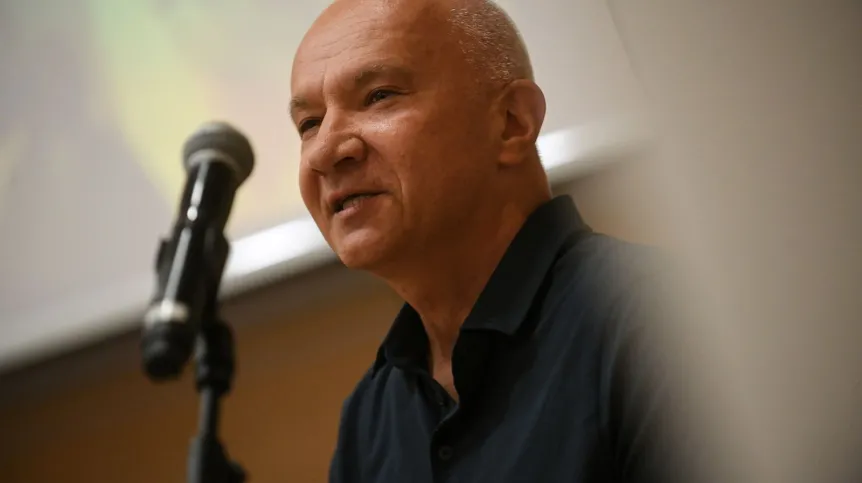
‘During my research, I saw that the services were interested in cracking solutions developed thanks to quantum cryptography. This is because if these solutions fall into the hands of terrorists, monitoring them will become impossible,’ says Professor Artur Ekert, co-founder of quantum cryptography.
Professor Artur Ekert is the co-founder of a new field of science - quantum cryptography. He studied at the Jagiellonian University and has been associated with the University of Oxford since the late 1980s. In 2019, the Swedish press agency reported that Ekert was mentioned as one of the candidates for the Nobel Prize in Physics. He visited Warsaw in connection with the establishment of the Quantum Technologies Cluster - Cluster Q at the Centre for New Technologies of the University of Warsaw.
PAP: Will quantum cryptography start a revolution similar to that associated with steam machines and electricity? Or is it just intellectual stimulation?
Professor Artur Ekert: There is definitely an element of intellectual stimulation in it. Quantum cryptography itself probably won't start such a revolution, but quantum technologies might - they will change the world. And when I say this, I'm trying not to be too enthusiastic. The possibilities of quantum phenomena have the same potential as electricity did. At that time it was not clear what it could be used for.
Today we can see that some of these technologies are used in quantum cryptography, or in super-precise detectors - sensors. Quantum metrology takes advantage of this - it enables various measurements of time, frequency, gravitational and magnetic fields.
The measurement of the gravitational field can be so precise that it can be successfully used to search for minerals. Quantum technologies also help control devices where there is no access to a satellite - like underwater, because they sense differences in the gravitational field. This is all due to the fact that each place produces a slightly different gravitational field, but we do not feel it because the differences are very small.
PAP: What about quantum computers?
A.E.: They do not exist yet, contrary to what you sometimes read in the media. There is a lot of information noise on this topic. But once they are developed, perhaps there will actually be a revolution. Because it's not just about much better computing power. And it's not about the speed of calculations, because individual logic gates will not work any faster. It's about the possibility of creating completely different algorithms in quantum computers. The instruction set that a quantum computer has is much larger than the set that a classical computer has.
PAP: Does this mean that quantum computers will replace ordinary computers? Is this what the race is about?
A.E.: Not necessarily. The race is about the fact that classic computers have their limitations. We know that there is a group of problems that are extremely difficult for classical computers - no matter how fast they are. Computer scientists examine the degree of complexity of various algorithms and it is known that the problems that need to be solved are divided into easy and difficult ones. Various types of ciphers are based on this.
PAP: Will quantum computers be reserved for fast calculations?
A.E.: They will be more efficient. They will be reserved for certain calculations for which classical computers do not have good algorithms. The problem isn't speed itself. It takes an algorithm to solve the problem. Algorithms are divided into those that are efficient - fast, and those that are not efficient.
PAP: So it is not a matter of the computer, but of writing a good algorithm.
A.E.: Precisely. Progress in this field happens when someone comes up with the next algorithm that is efficient. But sometimes there are problems that people think about for a long time and are unable to find an efficient algorithm. They don't even know if it exists. And at some point quantum computers come along. Their strength lies in their different set of instructions. Every algorithm consists of instructions. The list of instructions that a quantum computer can do is larger - it is a superset.
There are certain instructions that a classical computer will not understand, because there is no physical phenomenon that would implement this instruction. Different instructions enable the creation of completely different algorithms. These algorithms are not dominant in the sense of primitive speed, they are just 'smarter'.
PAP: What will be the consequences?
A.E.: A quantum computer will take away the security of certain classic ciphers. When I order a book on Amazon, mathematics protects me. If quantum computers appear, this cipher will be easy to break. This is a big problem now. The US National Security Agency is well aware that although a quantum computer does not exist yet, we already need to think about protecting these ciphers. We need to be prepared because we want certain data - which are encrypted today - to remain secret in 100 years. People are thinking about constructing next-generation classical ciphers that would be resistant to attacks by quantum computers. Quantum cryptography is resistant to these attacks, but it will not replace all the cryptographic methods we currently use. Therefore, it makes sense to look for new solutions in classical computing.
PAP: But your approach to quantum cryptography is gaining popularity.
A.E.: I admit that I am a bit surprised by this. This was the result of my PhD at Oxford. I never thought it would ever translate into practice. I used an idea that was based on 'Bell's inequality' - a theorem formulated by John Stewart Bell in 1964. Bell, who worked at CERN, performed experiments that showed that there was no other, deeper theory than quantum mechanics, and randomness was inherent.
I used this argument. I figured that if this were true, then quantum cryptography - using photons - could be used to check whether a system was being tapped. I used tools that had previously been developed for philosophers. Except I used them for a more practical purpose: to transmit information.
It was a big surprise to Bell when I told him about it. He did not believe that his theory could have practical applications. Just before his death, he recommended people to do something different every day and treat 'inequality' as a hobby. Besides, he himself treated 'inequality' as a hobby. At CERN, he was employed to design elementary particle accelerators. Meanwhile, after his death, he is mainly associated with his 'inequality'. Sometimes we are known for what we are not paid to do.
PAP: Your rediscovery reminds us that whoever has information, has power.
A.E.: It is a bit like that. If we implement something that will serve a bad purpose, the information cannot be monitored. Of course, there are also positive scenarios - cryptography can be used to protect electronic signatures and verify data.
Quantum cryptography mainly deals with transmitting data from one place to another. So it will not completely replace all aspects of data protection cryptography that we have today. But it can replace many of them. Those who develop quantum technologies will have an advantage. During my research, I saw that the services were interested in breaking solutions developed thanks to quantum cryptography. Because if they fall into the hands of terrorists, monitoring them will become impossible.
PAP: Are you saying that an undetectable 'Pegasus' will be created?
A.E.: No, it is not that type of technology. The services may only be interested in encryption methods that are difficult to break.
PAP: Can quantum technologies actually play a significant role in the country's defence?
A.E.: Cryptography - probably not yet, but quantum metrology can - i.e. better sensors. But metrology has applications in both defence and medicine. Precision measuring components can be used for a variety of things.
PAP: Have you ever had a thought similar to the one that terrified Einstein when he learned about the construction of an atomic bomb? Technology used theoretically for defensive purposes actually threatened life on Earth.
A.E.: Quantum cryptography is not an atomic bomb. Quantum cryptography will create many opportunities, but I think it will do more good than bad. You can always create a very pessimistic scenario. You can use electricity to power lamps - and electric chairs. So far, no one has used quantum cryptography for such purposes that I would feel morally responsible for something bad.
PAP: The Chinese are already taking advantage of your discovery. Quantum cryptography was also used for communication at the Tokyo Olympics. Did you regret not applying for a patent?
A.E.: No. My idea was too general. Many people after me gave it shape. I was a sculptor who had just picked up a chisel, but others finished the project. I am a supporter of open access. It is important that people from outside have access to ideas. Closing the door to the laboratory also cuts you off from the knowledge that accumulates outside. The creators of cryptology understand this. It is better to make the encryption method public, because the whole world that will be watching it will quickly point out its weak points. Such criticism is very creative.
PAP: Criticism will also allow for quick implementation of security measures if unauthorized movements are detected.
A.E.: Exactly.
PAP: You are the co-founder of a new area of knowledge: quantum information. This is the synergy of as many as six fields of science: physics, quantum physics, information theory, cryptography, computer science and engineering. You can create countless connections from this.
A.E.: That is correct. It is an extremely interdisciplinary field. There are also elements of philosophy and theoretical physics. At the beginning, it was extremely difficult for us because computer scientists and physicists could not find a common language. Computer scientists had to learn quantum phenomena, and physicists had to learn information theory. Observing how a new language emerged was fascinating. The most interesting things happen at the intersection of scientific disciplines. The problem is that getting money for such research is still very difficult. Projects are bounced around grant committees like a ping-pong ball.
PAP: Which interface between disciplines interests you the most?
A.E.: The nature of randomness. I ask myself whether it is inherent or not. There is some math, physics and philosophy involved.
PAP: Where did you draw your inspiration from?
A.E.: From the history of science. Roger Penrose once told me about an Italian, Girolamo Cardano, who was a Renaissance man. He (Penrose - PAP) was surprised that one person invented complex numbers and probability theory. Under the influence of these words, I looked at the biography of Girolamo Cardano. It was very enlightening.
The English saying about standing on the shoulders of giants is once again confirmed. Definitely.
PAP: However, combining quantum cryptography with philosophy sounds out of this world.
A.E.: I agree - it's out of this world. Philosophers felt appreciated by my discovery. Because physicists have always looked down on philosophers - they were the ones who couldn't write equations. People used to say that philosophers were made to be intellectual idols, but often there was not much to gain from their talk. When I showed in my work that the question of whether something exists (which was part of 'Bell's inequality') was applicable in physics, it was exciting for everyone.
PAP: You have built your discovery on uncertainty.
A.E.: Yes. My starting point was that information is physical. It is not an abstract entity. It is always encoded in something - in a magnetic field, in a photon that has polarization, or in something else. Eavesdropping consists in measuring something. Once you measure it, it stops being random. Therefore, 'Bell's inequality' helps measure whether something was random before - or not.
PAP: What will this quantum technology look like in five years?
A.E.: Quantum cryptography will gain ground. We will use quantum sensors, but we will not have a quantum computer yet. This technology is too complicated. A quantum computer has too many components that need to work together seamlessly. For example, precisely controlling an atom so that it moves with certain accuracy. In five years, we still won't have the technology to do this. We have the materials, but we don't have the methods.
PAP: What topic will you be dealing with now?
A.E.: I will explore the topic of randomness. I want to find out if Einstein was right when he said that something is unpredictable - it's only because we lack information. He believed that there is always a theory to explain randomness - it just takes time to discover it.
I have always been interested in basic science - developing it brought me joy. I have never been good at creating a vision for a product that can be sold to make money. But I see people who are good at it - and it is good that they are. I am not good at building relationships with businesses and I would rather stick to basic research. It is a completely different way of thinking - it probably had a big impact on my reaching into philosophy.
PAP: Is it because you believe that not every basic research should be taken over by business?
A.E.: I have nothing against doing research that a priori will not be useful to anyone. This is an integral element of the development of science. (PAP)
Author: Urszula Kaczorowska
uka/ zan/ kap/
tr. RL













